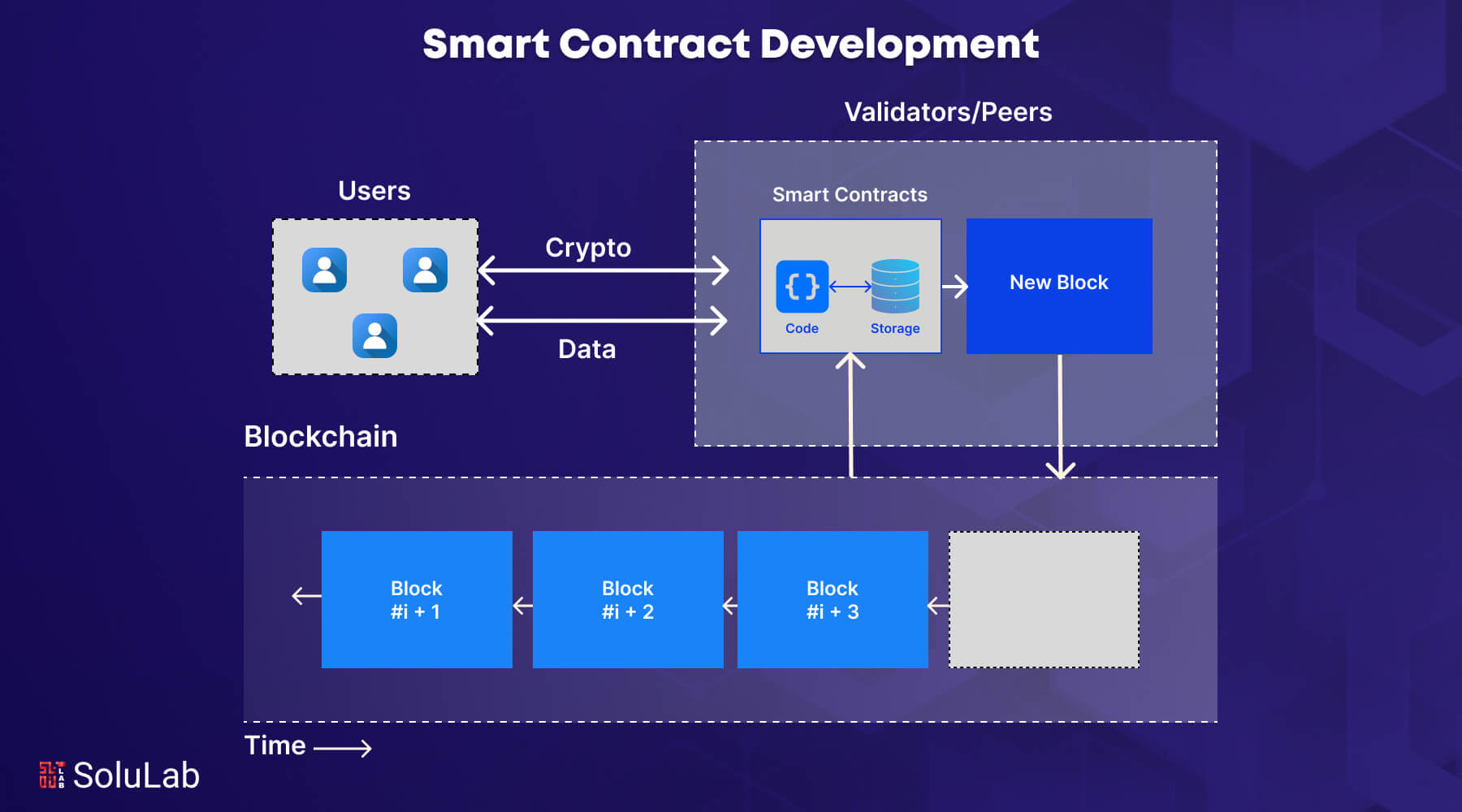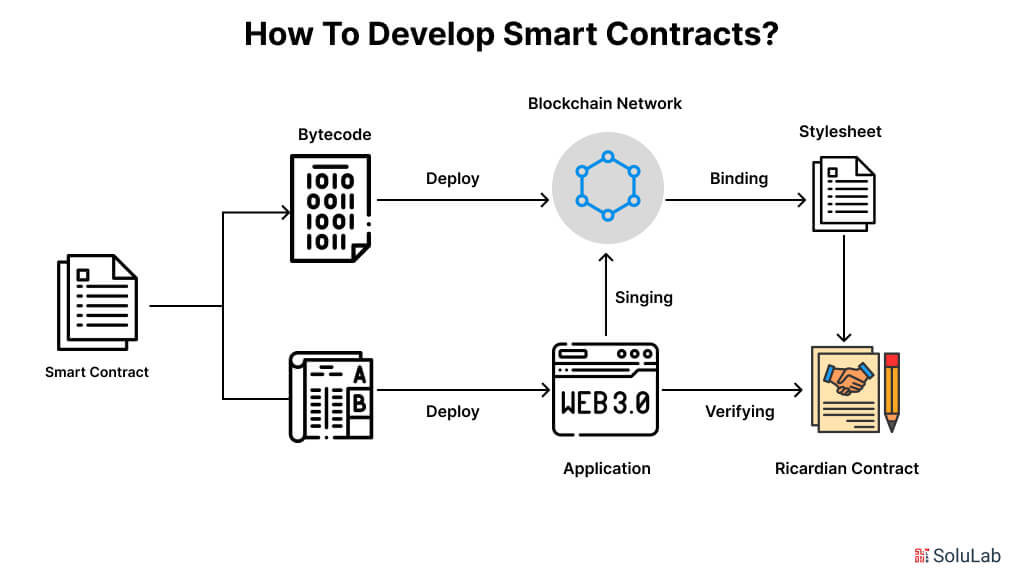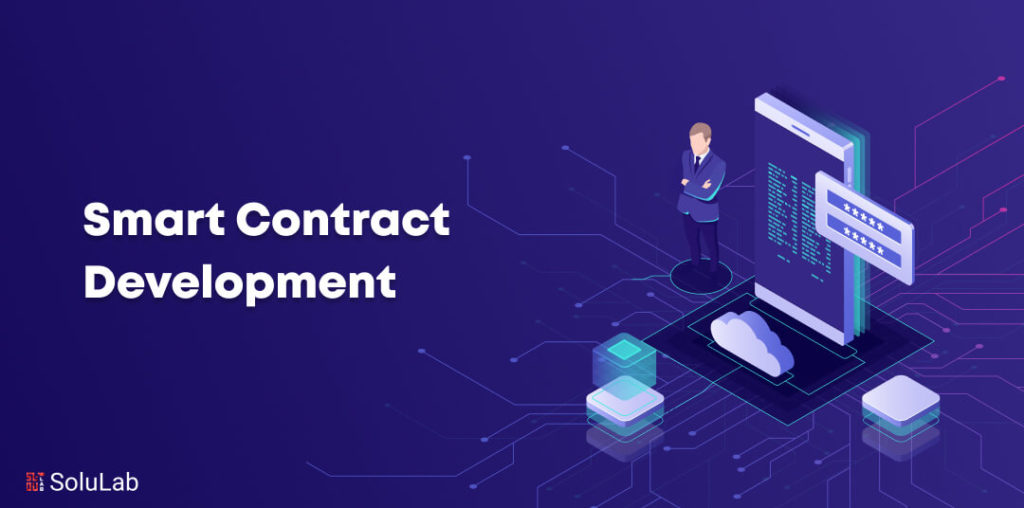
Have you ever wanted that contracts could operate without any delays, middlemen, or problems with trust?
In 2026, smart contracts are changing industries like finance, supply chain, healthcare, and real estate by automating transactions with pinpoint accuracy and full transparency. But building a smart contract requires an understanding of blockchain, coding, and security best practices. Learning how to create smart contracts will open up new possibilities for anybody involved with technology, be it a developer, company founder, or tech enthusiast.
In this step-by-step guide, we’ll walk you through everything you need to know to build secure and functional smart contracts in 2026—from choosing the right platform to deploying your first contract. Let’s begin!
What are Smart Contracts?
Smart contracts are self-executing digital agreements written in code that automatically carry out the terms of a contract when predefined conditions are met. Built on blockchain technology, they remove the need for intermediaries like lawyers or banks, making transactions faster, cheaper, and more secure. Once deployed on a blockchain network, like Ethereum, these contracts are immutable and transparent, meaning they can’t be altered or tampered with, and everyone on the network can verify them.
For example, a smart contract could be used to automatically transfer ownership of a digital asset once payment is confirmed. Because the process is governed by code, it reduces the chances of fraud or disputes. From finance and insurance to real estate and gaming, smart contracts are changing industries by enabling trustless and efficient digital interactions.
How Do Smart Contracts Work?
A smart contract is a legally enforceable agreement between two parties, just like any other contract. It utilizes the benefits of blockchain technology to increase effectiveness, transparency, and privacy. These are steps that are required for smart contracts to operate.
1. Agreement: The terms and conditions of the arrangement must be agreed upon by the parties wishing to transact business or trade goods, or services. They also have to decide how a smart contract will work, including what needs to happen in order for the agreement to be completed.
2. Contract creation: There are several ways for participants in a transaction to construct a smart contract, such as working with a smart contract provider or developing it oneself. A programming language is used to code the contract’s terms. It is crucial to thoroughly confirm the contract’s security at this point.
3. Deployment: The contract has to be posted on the blockchain after it is finalized. The code is entered into the exchange’s data field, and the smart contract is posted to the blockchain in the same manner as other cryptocurrency transactions. The transaction is considered active on the blockchain after verification and cannot be undone or changed.
4. Conditions monitoring: A smart contract operates by keeping an eye on the blockchain or another trustworthy source for preset prompts or conditions. Any digitally verifiable event, such as a date reached or a payment completed, can serve as one of these triggers.
5. Execution: The smart contract is activated per the “if/when…then…” statement when the trigger criteria are satisfied. This may include registering the buyer’s control over an asset or transferring money to a vendor, among other things.
6. Recording: The blockchain instantly publishes the outcomes of contract execution. The completed agreement is stored on the blockchain after the blockchain system confirms the acts conducted and records their completion as an exchange. This document is always accessible.
Read More: What Problems Do HTLC Smart Contracts Solve in Crypto Payments?
Role of Blockchain in Smart Contract Execution
The global smart contracts market is projected to reach $3.21 billion in 2025, growing from $2.63 billion in 2024, with a CAGR of 22%. Blockchain plays a crucial role in how smart contracts work and execute smoothly. Here’s how blockchain supports smart contract execution:
- Decentralized Environment: There’s no central authority controlling the contract. Blockchain ensures that everyone sees the same version of the contract and its outcome.
- Immutability: Once a smart contract is deployed, it can’t be changed. Blockchain locks the code in place, which helps build trust between all parties involved.
- Automatic Execution: When the conditions coded into the contract are met, the blockchain triggers automatic execution. No manual input, no delays.
- Transparency: All parties can verify the contract details and their execution history because everything is recorded on a public ledger.
- Security: Blockchain’s cryptographic features protect smart contracts from tampering or unauthorized changes, making them extremely secure.
- Auditability: Since every transaction is recorded, it’s easy to track and conduct smart contract audit for behavior anytime in the future.
- Cost-Effective: By removing middlemen like lawyers or brokers, blockchain helps reduce operational costs in contract management.
Benefits of Smart Contract Development
In recent years, smart contracts—self-executing computer programs that operate on a blockchain—have grown in popularity. The following are some benefits of developing smart contracts for your company:
-
Enhanced Effectiveness
Numerous tasks associated with carrying out a contract, including identity verification, payment execution, and contract enforcement, may be automated using smart contracts. Because it streamlines the contract execution process and does away with the need for middlemen, this may save firms both money and time.
Read Blog: Benefits of Blockchain-as-a-Service?
-
Increased Safety
Once smart contracts are implemented on a blockchain, they cannot be changed and are impervious to tampering. They become far more secure as a result, and the possibility of fraud or other interference is decreased. Furthermore, smart contracts employ encryption to safeguard contract data and guarantee that only authorized parties may access it.
-
Higher Transparency
Blockchain consulting offers an open and unchangeable record of all transactions, is used to carry out smart contracts. Since all parties to the contract have access to the same information and records, this promotes accountability and transparency.
-
Lower Expenses
Smart contracts may drastically lower the expenses involved in carrying out a contract by doing away with the need for middlemen like bankers, attorneys, and other intermediaries. Furthermore, smart contracts can lower the possibility of mistakes and disagreements, which will cut expenses even more for companies.
-
Enhanced Reliability
Because smart contracts are automatically performed in accordance with predefined circumstances, they are extremely dependable. This guarantees that the contract is carried out precisely as planned and lowers the possibility of mistakes or omissions.
-
Accelerated Speed
By automating many of the necessary stages, smart contracts may greatly accelerate the contract execution process. This can shorten the time needed to carry out an agreement, which is especially advantageous for contracts with tight deadlines.
-
Better Precision
Because smart contracts operate automatically in response to preset parameters, there is less chance of mistakes or omissions. This can lessen the possibility of disagreements or misunderstandings and increase the precision with which contracts are executed.
-
Adaptable Contract Conditions
Smart contracts may be tailored to your company’s unique requirements. This saves you from using pre-made contract templates and enables you to customize the terms of the agreement to your own needs.
-
Getting into a Global Marketplace
On a blockchain network, smart contracts may be carried out, giving users access to a worldwide market. By enabling you to sign contracts with people all around the world, this can increase the potential for your firm.
-
Improved Trust
As an unchangeable and transparent record of every transaction, smart contracts may foster more confidence between parties. By doing this, the chance of disagreements or miscommunications can be decreased and trust between the parties can grow.
Use Cases of Smart Contract
Digital contracts are being cleverly used by supply chains, insurance companies, and many more to cut expenses on administration and services. Let’s examine the many industry use cases for smart contracts:
-
Real Estate
The procedure of purchasing and selling flats is changing due to real estate smart contracts. They integrate the roles of brokers and notaries into a single, self-contained system. It is not required to negotiate a price, make changes to the title, or do any other tasks that are normally performed by attorneys and real estate investment agents.
Read Also: Why AI Smart Contracts Are the Future of Business?
-
Payment Services
Digital contracts can handle a lot of loan-serving tasks, including paying taxes, insurance companies, and collecting and disbursing payments. Each operation is independent, publicly responsible, and completely encrypted. They can be applied to banking processes both inside and outside the company. Furthermore, by simplifying the procedure, they have eliminated the possibility of human error.
-
Healthcare
The introduction of an Electronic Health Record System (EHR) transformed healthcare delivery in a regional healthcare system that was beset by ineffective paper-based patient records. The health institution prepared its medical staff to ensure a seamless adoption after choosing a reliable EHR vendor and negotiating a thorough contract that prioritized data security and interoperability.
-
Insurance
The current insurance system is costly and does not inspire confidence among stakeholders. Using digital assets for insurance rather than creating a ton of paper agreements might be the solution to this issue.
-
Supply Chain
In addition to other critical points in the supply chain and procurement automation, smart contract technology may be integrated into a product as soon as it is loaded into a truck or transported to its final destination. Payments are made in compliance with the document’s parameters to each party in the supply chain upon delivery of the goods. A corporation may also receive a notification from the system if its stock falls below a certain level, indicating the need for a product reorder.
How to Develop Smart Contracts?

The creation of smart contracts is a difficult process that calls for a thorough grasp of blockchain technology, encryption methods, and programming languages.
-
Determine the Business Requirement
Determining the business requirement for a smart contract is the first stage in the development process. This entails determining the contract’s parties, the operations that can be automated, and the advantages of automation.
-
Specify the Contract Terms
Determining the contract’s terms is the next stage. This entails stating who is who, what the terms are, and what has to happen in order for the contract to go into effect. To make sure the smart contract deployment appropriately represents the conditions of the agreement, this stage is essential.
-
Select the Blockchain Network
Selecting a blockchain platform to implement the smart contract on is the next stage. This entails comparing and contrasting systems according to attributes including usability, security, and scalability. The blockchain systems Ethereum, Hyperledger Fabric, and EOS are well-liked for developing smart contracts.
-
Choose a Programming Language
Choosing a programming language to create the smart contract is the next stage. Solidity, the programming language used on the Ethereum platform, is the most often utilized for creating smart contracts. Additional programming languages utilized in the creation of smart contracts are Simplicity, Chaincode, and Vyper.
-
Create the Smart Contract Code
The smart contract must then be coded using the programming language and contract terms chosen in the earlier stages. This entails writing the code that, in accordance with the parameters specified in the contract terms, will carry out the agreement. To make sure that the contract works as planned, the code has to be designed very precisely.
-
Test the Smart Contract
It is crucial to properly test the smart contract after it has been decided on how to design a smart contract to make sure it functions as planned. This entails assessing the contract’s performance as well as checking the code for mistakes and defects. To make sure the smart contract works as planned, testing is an essential stage in the development process.
-
Deploy the Smart Contract
The smart contract may be implemented on the selected blockchain platform after it has been tested. This entails running the smart contract code after uploading it to the blockchain. The parties to the contract can oversee and control the smart contract once it has been implemented.
-
Monitor and Manage the Smart Contract
Monitoring and maintaining the smart contract is the last phase in the creation process. This entails keeping an eye on how the contract is being carried out, handling any problems that come up, and revising the contract as necessary. To make sure the contract is safe and keeps working as intended, it is crucial to keep an eye on it and manage it.
What Is The Standard Time To Complete A Smart Contract Development?
Creating a smart contract would typically take seven to fifteen days depending on the framework and complexity, the developer’s experience. However, this is not the precise amount of time needed to create a smart contract. The following are some possible variables that might affect how long it takes to establish a smart contract:
- Expertise of the developer in programming languages
- Resources
- Testing and fixing the issues
- To ensure precision and safety
It won’t take more than a month to create a smart contract. Once everything is finished, you may start using your smart contract right away. We are grateful for the abundance of modern innovations that have made the production of smart contracts easier.
Conclusion
Smart contracts are changing how digital agreements are created and enforced, offering speed, security, and automation without the need for intermediaries. In 2026, understanding the step-by-step process of smart contract development is essential for developers, businesses, and tech enthusiasts alike.
From choosing the right blockchain platform to writing, testing, and deploying secure code, every stage plays a vital role. With growing adoption across industries, smart contract skills are becoming increasingly valuable.
SoluLab, a top smart contract development company, can help you build a smart contract from ideation to deployment and maintenance. Contact us today to discuss further.
FAQs
1. How does a smart contract execute a transaction?
A smart contract executes a transaction automatically when predefined conditions are met, using blockchain to validate, record, and enforce the agreement without any manual intervention.
2. What are the 4 major parts of a smart contract?
The 4 major parts are the contract address, state variables, functions, and events. These components handle the contract’s identity, store data, execute logic, and record actions.
3. What are the components of a smart contract?
Smart contracts comprise data storage, functions, conditions, and interfaces for interactions. Together, they automate transactions on the blockchain.
4. What Is the Timeline for Smart Contract Development?
Development timelines depend on complexity, usually ranging from 2 weeks to 2 months. Factors include functionality, testing, and security audits.
5. How much does smart contract development cost?
Costs vary based on scope and expertise, typically ranging from $5,000 to $50,000, covering design, coding, and auditing.






